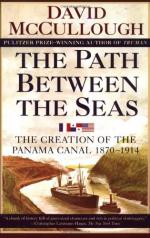|
This section contains 1,173 words (approx. 4 pages at 300 words per page) |

|
The Panama Canal
Summary: A history of the building of the Panama Canal, focusing mainly on the importance of a connecting route between the Atlantic and Pacific oceans as well as diseases such as yellow fever, typhoid fever, and malaria that ran rampant throughout Central America.
In 1869 the French had successfully completed the Suez Canal, and that was what would soon be the inspiration for the Panama Canal. The French began work on the Panama Canal in 1884 and sent about 19,000 men down to Central America. The French were not the first to think of putting a canal that bisects Panama's isthmus, back in 1534, Charles V, the king of Spain, thought of the canal to make the voyages from Peru and Ecuador to Spain much easier. In 1889 the constructor, Lesseps, had to declare bankruptcy. By 1893 more than 22,000 French workers had died from yellow fever, typhoid fever, or malaria. In 1894 the New French Company took over the building process. "On June 19, 1902, the U.S. Senate passed a bill that authorized Theodore Roosevelt, the president at the time, to acquire the effects of the French company for not more than forty million dollars, to acquire from the...
|
This section contains 1,173 words (approx. 4 pages at 300 words per page) |

|


